Real eState
Over 60 per cent of area condos owned by real estate investors
“It confirmed what we have believed has been a trend for the last 10 years,” said economist and Smart Prosperity Institute senior director of policy Mike Moffatt.
“Ontario, in particular, has seen a lack of purpose-built rentals. For years, investors have been buying condos and renting them to students, post-graduates and those who can’t become first-time buyers because of high home prices.
The study was based on data collected in 2020 and from the 2021 Canada Census, but Moffatt said the trend only accelerated during the COVID-19 pandemic.
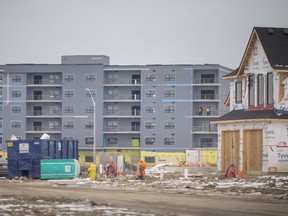
A growing population, increased immigration and more international students attending Ontario’s post-secondary institutions have added to rising demand.
Also included in the study were Nova Scotia, New Brunswick, Manitoba and British Columbia.
Nova Scotia (31.5 per cent) and New Brunswick (29 per cent) had the highest percentage of investor representation. However, a significant percentage of those investors were for multiple properties that were vacant lots.
Less than two per cent of Ontario investors owned two or more vacant lots in the province.
Investors owned 23.3 per cent of all housing stock in British Columbia and 20.4 per cent in Manitoba.
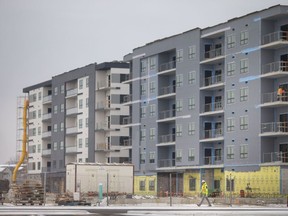
In Southwestern Ontario, London followed a similar pattern to Windsor with 14.1 per cent of all homeowners being investors and 86.5 per cent of condo owners.
By comparison, Toronto’s investor ownership of condos was 36.2 per cent.
“Condos are particularly popular with investors in cities between 300,000 and 400,000 people with a high number of students in university and college,” Moffatt said.
“It makes condos a very attractive investment.”
“It’s kept rents from going up higher than they otherwise would have because there would have been even more of a shortage or rentals,” Moffatt said.
“A growing population had to be housed somewhere.”
Condominiums are particularly attractive to investors classified as businesses.
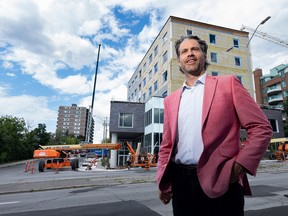
In Windsor, 45.1 per cent of all condos were owned by businesses while it was 77.9 per cent in London.
“Condos are attractive because they’re the easiest type of investment category to operate in,” said Rhys Trenhaile, CEO of Walkerville Capital investment firm and a realtor with The Vanguard Team that specializes in income-generating properties.
The additional benefits for investors are they get a tax write off as landlords, they historically enjoy real estate appreciation and the tenant pays down their mortgage.
Trenhaile added Windsor’s high percentage of investor-ownership in condos is the result a combination of factors that have built up over the years.
He said it’s common for companies, such as electrical and plumbing contractors wishing to be involved in a project, to purchase a few units in a proposed building to help the developer get enough pre-sales to secure funding to launch construction. Many choose to hold onto those units as investor income.

Then there are investors who have been attracted by Windsor’s low prices and the chance to generate larger monthly cash flows than they can from condos in the Greater Toronto Area. With no intention of residing in the building, they can wait the two years for the units to be finished.
The third factor is many people in the past who bought a condo as their first home don’t need to get the equity out of it when they’re looking for something bigger. They choose to rent their unit out as a new income stream.
“The whole process of building condos kind of encourages investor interest,” said Trenhaile, who added Greater Toronto has been the main source of outside investment in the local market for 20 years.
“Most of us can’t wait for two years for our home to be finished.”
He expects demand to only grow and admits surprise that only 12.1 per cent of all residences locally are held by investors.
“I think you’ll see that number come up given people are now allowed to create additional dwelling units on their lots,” Trenhaile said.
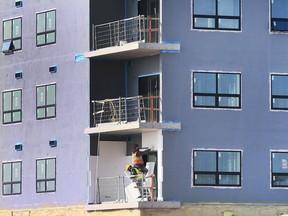
Moffatt said the growth of investors owing slightly more than one in five homes in Canada should be concerning. It’s creating a bottleneck on the property ladder that also impacts the rental market.
“The concentration of investors on the home ownership side is real problematic for first time buyers,” Moffatt said.
“There’s less movement in the rental market, more competition, not enough available units and rents go up. They end up competing with more investors who are attracted to the condo market because the shortage creates opportunity.”
Windsor-Essex County Home Builders’ Association vice-president Brent Klundert said speculation in the new home market has also grown locally. Such activity isn’t currently at the level seen during the heights of the COVID pandemic, but Klundert feels smart investors are just trying to time the bottom of the market before jumping back in.
“We did see an influx of out-of-market buyers,” Klundert said.
“Investors would invest in a home or townhouse bet the market would increase and they could sell the contract at a higher price before construction even finished.”
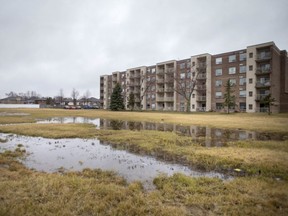
At one point, homes could increase in value during construction by more than $100,000 over the initially agreed price.
Despite the pause in investor activity, Klundert said interest in the region is still percolating. He noted the positive January numbers for new-builds contracts.
“Windsor prices are still better than the GTA, so they can enter the market easier,” Klundert said.
“The economic outlook is bright. I think there’s still money looking at this area.”
“Bigger projects are coming fast and furious because of the supply crisis,” Klundert said. “We need to speed up approvals, so we can build more and faster.”
Windsor-Essex County Association of Realtors’ president Mark Lalovich said 2023 will be a transition year, but noted the market is lagging right now compared to 2021 and 2022 for investor interest.
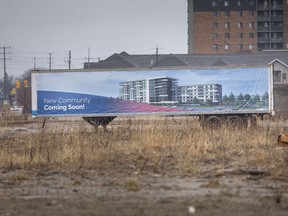
Lalovich said purchases in the area handled by out-of-board agents were 20 of 265 sales last month versus 105 out of 676 in November 2021.
“We know we’re not capturing all out-of-town sales, as some are handled by agents in our board, but it shows what we’re seeing right now locally,” Lalovich said.
Lalovich added local developers he’s talked to feel we’re 12 to 18 months away from seeing the market become more active and prices begin to spike again.
In Lalovich’s opinion, movement among local homeowners this year will spill into the rental market generating more turnover in both sectors.
“Investors are quiet because of the interest rates and their sensitive to rates of returns,” Lalovich said.
“Most are sitting on the sidelines waiting to see what happens.
“That helps homeowner occupants get into the market. You don’t have competing investor interest.
“It’s better for the buyer because you’re in a more relaxed environment.”
dwaddel@postmedia.com
twitter.com/winstarwaddell

Real eState
Greater Toronto home sales jump in October after Bank of Canada rate cuts: board

TORONTO – The Toronto Regional Real Estate Board says home sales in October surged as buyers continued moving off the sidelines amid lower interest rates.
The board said 6,658 homes changed hands last month in the Greater Toronto Area, up 44.4 per cent compared with 4,611 in the same month last year. Sales were up 14 per cent from September on a seasonally adjusted basis.
The average selling price was up 1.1 per cent compared with a year earlier at $1,135,215. The composite benchmark price, meant to represent the typical home, was down 3.3 per cent year-over-year.
“While we are still early in the Bank of Canada’s rate cutting cycle, it definitely does appear that an increasing number of buyers moved off the sidelines and back into the marketplace in October,” said TRREB president Jennifer Pearce in a news release.
“The positive affordability picture brought about by lower borrowing costs and relatively flat home prices prompted this improvement in market activity.”
The Bank of Canada has slashed its key interest rate four times since June, including a half-percentage point cut on Oct. 23. The rate now stands at 3.75 per cent, down from the high of five per cent that deterred many would-be buyers from the housing market.
New listings last month totalled 15,328, up 4.3 per cent from a year earlier.
In the City of Toronto, there were 2,509 sales last month, a 37.6 per cent jump from October 2023. Throughout the rest of the GTA, home sales rose 48.9 per cent to 4,149.
The sales uptick is encouraging, said Cameron Forbes, general manager and broker for Re/Max Realtron Realty Inc., who added the figures for October were stronger than he anticipated.
“I thought they’d be up for sure, but not necessarily that much,” said Forbes.
“Obviously, the 50 basis points was certainly a great move in the right direction. I just thought it would take more to get things going.”
He said it shows confidence in the market is returning faster than expected, especially among existing homeowners looking for a new property.
“The average consumer who’s employed and may have been able to get some increases in their wages over the last little bit to make up some ground with inflation, I think they’re confident, so they’re looking in the market.
“The conditions are nice because you’ve got a little more time, you’ve got more choice, you’ve got fewer other buyers to compete against.”
All property types saw more sales in October compared with a year ago throughout the GTA.
Townhouses led the surge with 56.8 per cent more sales, followed by detached homes at 46.6 per cent and semi-detached homes at 44 per cent. There were 33.4 per cent more condos that changed hands year-over-year.
“Market conditions did tighten in October, but there is still a lot of inventory and therefore choice for homebuyers,” said TRREB chief market analyst Jason Mercer.
“This choice will keep home price growth moderate over the next few months. However, as inventory is absorbed and home construction continues to lag population growth, selling price growth will accelerate, likely as we move through the spring of 2025.”
This report by The Canadian Press was first published Nov. 6, 2024.
The Canadian Press. All rights reserved.
Real eState
Homelessness: Tiny home village to open next week in Halifax suburb

HALIFAX – A village of tiny homes is set to open next month in a Halifax suburb, the latest project by the provincial government to address homelessness.
Located in Lower Sackville, N.S., the tiny home community will house up to 34 people when the first 26 units open Nov. 4.
Another 35 people are scheduled to move in when construction on another 29 units should be complete in December, under a partnership between the province, the Halifax Regional Municipality, United Way Halifax, The Shaw Group and Dexter Construction.
The province invested $9.4 million to build the village and will contribute $935,000 annually for operating costs.
Residents have been chosen from a list of people experiencing homelessness maintained by the Affordable Housing Association of Nova Scotia.
They will pay rent that is tied to their income for a unit that is fully furnished with a private bathroom, shower and a kitchen equipped with a cooktop, small fridge and microwave.
The Atlantic Community Shelters Society will also provide support to residents, ranging from counselling and mental health supports to employment and educational services.
This report by The Canadian Press was first published Oct. 24, 2024.
The Canadian Press. All rights reserved.
Real eState
Here are some facts about British Columbia’s housing market

Housing affordability is a key issue in the provincial election campaign in British Columbia, particularly in major centres.
Here are some statistics about housing in B.C. from the Canada Mortgage and Housing Corporation’s 2024 Rental Market Report, issued in January, and the B.C. Real Estate Association’s August 2024 report.
Average residential home price in B.C.: $938,500
Average price in greater Vancouver (2024 year to date): $1,304,438
Average price in greater Victoria (2024 year to date): $979,103
Average price in the Okanagan (2024 year to date): $748,015
Average two-bedroom purpose-built rental in Vancouver: $2,181
Average two-bedroom purpose-built rental in Victoria: $1,839
Average two-bedroom purpose-built rental in Canada: $1,359
Rental vacancy rate in Vancouver: 0.9 per cent
How much more do new renters in Vancouver pay compared with renters who have occupied their home for at least a year: 27 per cent
This report by The Canadian Press was first published Oct. 17, 2024.
The Canadian Press. All rights reserved.
-

 News9 hours ago
News9 hours agoAffordability or bust: Nova Scotia election campaign all about cost of living
-

 News9 hours ago
News9 hours agoCanada’s Denis Shapovalov wins Belgrade Open for his second ATP Tour title
-

 News9 hours ago
News9 hours ago11 new cases of measles confirmed in New Brunswick, bringing total cases to 25
-

 News9 hours ago
News9 hours agoFirst World War airmen from New Brunswick were pioneers of air warfare
-

 News9 hours ago
News9 hours agoTalks to resume in B.C. port dispute in bid to end multi-day lockout
-

 News9 hours ago
News9 hours agoMuseum to honour Chinese Canadian troops who fought in war and for citizenship rights
-

 News9 hours ago
News9 hours agoThe Royal Canadian Legion turns to Amazon for annual poppy campaign boost
















